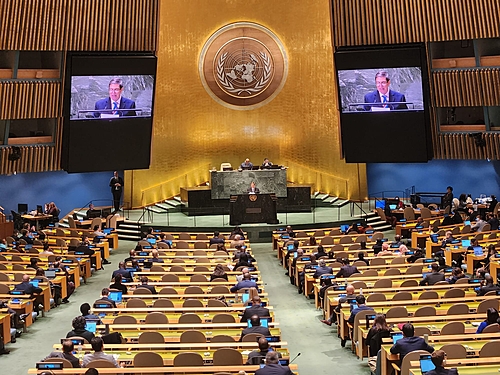
By an extraordinary majority, the UN General Assembly approved this Thursday (2) a resolution that demands the end of the economic and commercial blockade imposed by the United States against Cuba for more than six decades.
The pronouncement, which has been adopted annually for 31 years, was approved by 187 countries, with only one abstention (Ukraine) and opposition from the United States and Israel, which vote against it every year.
The vote took place shortly after Cuban Foreign Minister Bruno Rodríguez took the floor to denounce to the assembly that the blockade “violates the right to life, health, education and well-being of all Cubans” .
:: Former double agent launches book to tell the story behind the scenes of a project organized by the CIA in Cuba ::
In this sense, he denounced that “the blockade is an act of economic war in times of peace, with the aim of nullifying the government’s ability to meet the needs of the population, creating a situation of ungovernability and destroying the constitutional order.”
Rodriguez focused his criticism of US policy by stating that the blockade mainly affects the Cuban population, as it is “the country’s families who feel the shortages, excessive prices and devalued wages”. He also stated that “the US government is lying when it claims that the blockade does not impede access to medicines and medical equipment.”
“It is neither legal nor ethical for the government of a power to subject a small nation to decades of relentless economic warfare in order to impose a foreign political system and reappropriate its resources. It is unacceptable to deprive an entire people of the right to self-determination, to development and human progress”, he added.
Israel’s attacks are ‘ethnic cleansing’, says Palestinian ambassador to Cuba: ‘We will not accept a new catastrophe’
At the end of his speech, the Cuban diplomat stated that “the blockade is not responsible for all the problems our country faces today, as President Miguel Díaz-Canel has already said. But whoever denies its extremely serious effects and does not recognize that it is the main cause of the deprivations, needs and suffering of Cuban families is being false”.
In turn, the United States justified its position, through its deputy ambassador to the UN, Richard Mills, stating that the financial and commercial blockade imposed against Cuba has the objective of “advancing democracy and promoting human rights and freedoms” on the Caribbean island.
What is blocking?
The blockade against Cuba began in 1960. It is the longest-lasting policy of siege and economic suffocation in history. It was one of the US government’s first reactions against the revolutionary process that had triumphed on the island in 1959. Since then, the blockade has become the centerpiece of Washington’s efforts to bring about what they call “regime change” in Cuba.
Since then, the United States has implemented a complex web of laws and sanctions that deliberately seek to affect the Cuban economy and trade. During these more than 60 years, these unilateral sanctions have been reinforced at different historical moments, to the point that they currently affect other countries or companies that wish to maintain commercial links with the Caribbean island.
The draft resolution presented by Cuba this year is titled “Need to put an end to the economic, commercial and financial blockade imposed by the United States of America against Cuba.”
The document states that, from March 2022 to February 2023, “the blockade caused damage to Cuba, estimated at around 4,867 million dollars”, which is equivalent to losses of 13 million dollars per day.
‘The bombings have been recurring throughout my life’, says young Palestinian in Cuba
Thus, a significant part of the current economic crisis and the shortages that Cuba is experiencing have their main explanation in the effects of the blockade. “It is estimated that, in the absence of the blockade, Cuba’s GDP could have grown by 9% in 2022,” the document states.
The blockade is considered a violation of international law and Cubans’ human rights. The consequences of the blockade affect the entire Cuban population. Currently, it is estimated that more than 80% of Cubans have only known a Cuba with a blockade.
The problem of the blockade was first discussed at the UN General Assembly in 1992. Every year since then, the UN’s highest deliberative body has demanded the United States to lift its unilateral blockade against Cuba.
For more than 30 years, the draft resolutions presented by Cuba against the blockade were approved by a large majority, being rejected only by the United States, Israel and some circumstantial allies.
Last year, the resolution demanding an end to the blockade received an overwhelming majority of 185 votes in favor, two against (United States and Israel) and two abstentions (Ukraine and Brazil).
Editing: Leandro Melito

Source: www.brasildefato.com.br

